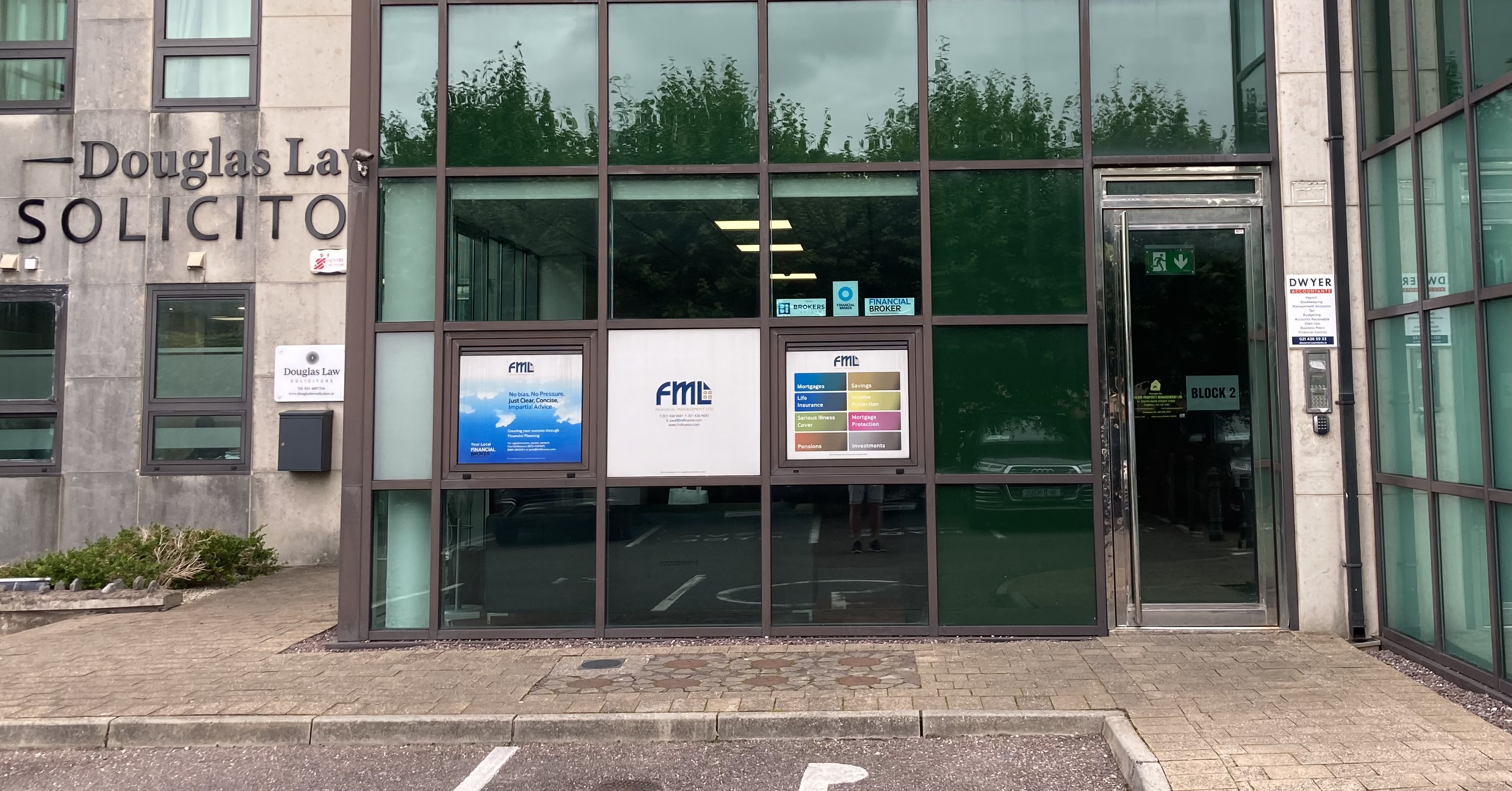 |
| FML |
 |
Financial Management Ltd
Unit 6,
Watergold,
Douglas, Cork. |
 |
T : 021 436 9681 |
 |
F : 021 436 9683 |
 |
M: 086 606 5654 |
 |
E: paul@fmlfinance.com |
|
Proud Members
of: |
|
|
|
|
 |
| FML Financial Management Limited is regulated by the Central Bank of Ireland. |
|
|
|
|
|
|
|
|
Financial Services
|
|
|
Pensions
Once you retire, will you be able to maintain your current standard of living on the state pension of c.€230.30 per week? If not, then you have to plan ahead and start saving now in order to supplement your income then. It is never too late to start a pension but obviously the earlier you start the easier it should be to achieve to your target fund at retirement. If you already have a pension, we at FML Financial Management Limited would advise that you review it on a regular basis in order to ensure that you are on target to reach your desired fund at retirement.
Very simply, Pensions are extremely tax efficient long term savings plans for retirement. You can claim tax relief at your marginal rate on the premiums, your savings growth is tax free and you can take a tax free lump sum on retirement.
There are many different types of pensions to suit all circumstances such as non pensionable employees, employees with existing occupational schemes, employers, self employed and company directors.
Below is a brief description of the various types of pension FML Financial Management Limited can help you with.
|
- Personal Pensions: If you are self employed or in non pensionable employment then it is up to you to plan for your own retirement.
- Executive Pensions: For company owners or directors, this product is designed specifically to take full advantage of the generous tax relief that is granted to Company pension arrangements.
- Group Schemes: For the employer who may wish to set up a pension vehicle for his employees, but with certain elegibility conditions. A trustee arrangement has to be in place for this type of pension.
- S.S.A.P.s: Small Self Administered Pension schemes are for the owner-director who wants absolute control over how their hard earned pension funds are invested. Investment options include property, bank deposits, land, managed funds, bonds, futures etc. etc. Trustees can now borrow funds from lenders to enable them to purchase particular assets with the minimum of outlay in order to maximise their pension fund's growth potential.
- Pension Term Assurance (Life Cover): Due to the generous tax relief, this is undoubtedly the best value life cover you can buy. This type of life cover can only be taken out on a single, own life basis and it is not assignable.
- A.R.F.s: When you retire you can take 25% of the fund tax free. Then, as well as the traditional choice of buying a guaranteed income for the rest of your life (an annuity), you now also have the choice of investing in an Approved Retirement Fund. This way you maintain control of the fund, it can still grow tax free, you can withdraw funds as you see fit, use it to buy an income at any time or use it as a tax efficient way to pass on a lump sum to your dependents in the event of your death.
- Individual P.R.S.A.s: As the name suggests, a Personal Retirement Savings Account is an account set up by you to save for your retirement.
- Employer P.R.S.A.s: All employers are obliged to provide their employees with access to some form of pension provision and this is probably the simplest way to meet that obligation.
- Employee P.R.S.A.s: A simple, convenient and transferable pension scheme set up with the aid of your employer.
- A.V.C. P.R.S.A.s: These are for individuals with existing occupational pension schemes who wish to maximise their entitlements by making Additional Voluntary Contributions into a completely separate, individual fund decided on by you.
|
|
Life Assurance:
Nobody likes to consider the possibility of their premature demise, but it is important to think of how such a tragic occurance would affect the ones you love. Would your family be financially secure in the event of your untimely death?
Life Assurance policies pay out a sum of money to your dependents or to your estate in the event of your death during the term of the policy. How much cover you should have in place and for how long depends on your personal circumstances. Needs vary depending on how many dependents you have and what ages they are, the amount of debts such as mortgages to be cleared from the proceeds, the level of death in service benefit you may or not have and any other assets or loans etc. etc.
We at FML Financial Management Limited can help you to analyse your needs, research the market to find the most competitive provider and ensure peace of mind for you and your family.
|
| Serious Illness Cover: |
|
Serious illness insurance pays out a tax-free lump sum if you are diagnosed with one of the specific illnesses or disabilities that your policy covers. It is also sometimes called critical illness cover or specified illness cover. This lump sum can be used to cover your medical expenses and/or provide an income should you have to give up work.
|
Savings and Investments:
Since the S.S.I.A.s many people have developed a very healthy savings habit. We can help you decide where is best for you to invest your hard earned lump sum or regular savings depending on your personal circumstances, your ultimate financial goal, attitude to risk, products on offer etc. etc. You have worked hard for your savings so before you invest them, make sure to speak to the experts at FML Financial Management Limited. |
|
Income Protection:
Should illness, injury or disability leave you unable to work for 3 months or more, how would you keep on top of the bills that matter such as mortgage repayments, car loans, food bills etc? How long will your employer keep paying you for? Could you survive on Government Disability payments? If you are self employed you would receive absolutely nothing!
With Income Protection you pay a monthly premium determined by your occupation and health to get the protection of a regular income for the duration of your illness, injury or disability until you return to work or until retirement.
A major benefit of this type of protection is that the premiums qualify for tax relief at your marginal rate. If you are self employed, you can have your business pay the premiums for you and they are an allowable expense against corporation tax.
|
|
Mortgage Repayment Protection:
Worried about the possibility of being made redundant? The thought of losing one’s home is a frightening one. We have a natural affinity with our primary residence and the thought of losing it is one which we do not like to even consider. However, if for any reason mortgage repayments cannot be made for an extended period, the possibility of losing one’s home becomes a reality. Don’t expose yourself or your family to this risk.
Mortgage Repayment Protection is a product designed to cover your mortgage repayments should you be unable to work for 30 days or more due to illness, accident or compulsory redundancy. If you are self employed or state employed, instead of redundancy cover, you are entitled to claim if you are hospitalised for 5 days or more. Benefits continue until you return to work or until a maximum of 12 monthly payments have been made on your behalf for any one claim.
|
|
| |
| |
| |
|
|
|
|
|
|